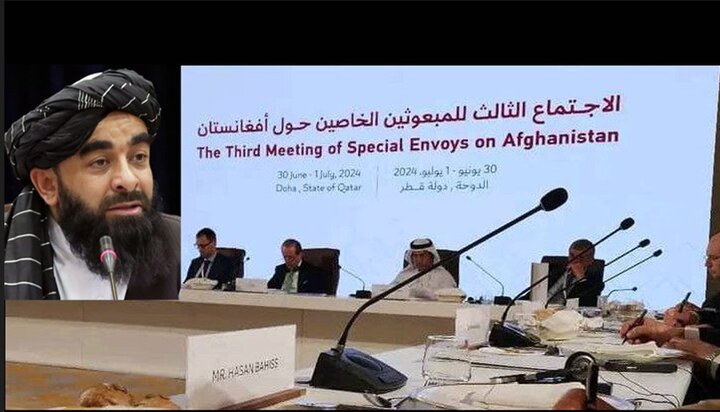Taliban and the third Doha meeting; Reflections and perspectives

Mehr News Agency, International Group: In June 1402, Qatar hosted the representative of the United Nations and also During a meeting, the representatives of some countries were to evaluate the solutions to improve the conditions in Afghanistan about two years after the Taliban came to power; The meeting that is now known as the first Doha meeting.
A few months later, in December last year, the second Doha meeting was held. This time, the representatives of the Taliban were also officially invited by Qatar, but they did not attend due to the non-compliance of their terms. The Taliban demanded that he attend the meetings as the only representative of Afghanistan and that other political activists of Afghanistan should not be considered as representatives of this country. After the participating countries opposed these conditions, the second meeting ended without the presence of the Taliban.
Many analysts were of the opinion that such meetings without the presence of the Taliban would be a complete failure and that the things agreed upon by other countries would never be implemented. On the other hand, some people agreed to not accepting the Taliban’s conditions and the presence of Afghan civil activists in these meetings, praising such measures in order to isolate the Taliban as much as possible and not recognize it. An analysis that was proved incorrect with the passage of time.
Now, on the 10th and 11th of July, the third Doha meeting, which is considered the first of its kind, was held. Zabihullah Mujahid, the spokesman of the Taliban government, attended the meeting for the first time at the head of a delegation of 6 people. This is undoubtedly a great victory for the Taliban because it did not back down from its terms and forced other countries to accept them. In the third meeting of Doha, active political women of Afghanistan were not present. This issue caused the protest of many civil activist groups in Afghanistan. But what distinguishes this meeting from the previous two sessions?
Third session; A different event
What should be noted most about the recent meeting is the conditions that facilitated the process of interaction with the Taliban. The international community, after the failure of numerous plans imposed from the outside on the special conditions of Afghanistan, has now realized that the Taliban is a reality that must be accepted. Isolation of the Taliban will not only bring benefits to the people of Afghanistan, but will also cause the crisis to intensify. Abandoning the Taliban and recognizing it during these years has not improved the education situation of girls, but the intensification of sanctions has made life difficult for the people day by day.
To save Afghanistan’s turbulent economy on the one hand and to fight the drug problem on the other hand, the Taliban considers itself inevitable to interact with the world and in this direction It considers both bilateral relations and participation in such meetings as an opening to overcome the current situation, as a result of these issues, meetings with the presence of representatives of the parties came to fruition.
Nevertheless, it would be far from reality if we consider the third Doha meeting a complete success. First of all, the central issues for the parties present in the meeting had major differences. While the representatives of the United Nations and European countries sought to emphasize issues related to human rights and the status of women and girls in Afghanistan, the representatives of the Taliban focused on economic issues and economy-oriented foreign policy. In other words, the United Nations seeks to make the recognition of the Taliban by other countries conditional on carrying out reforms in the field of women and human rights, while the representatives of the Taliban are seeking economic interaction with the countries of the world to get out of international isolation.
The representative of the Taliban showed videos of the destruction of poppy fields in this meeting and then asked for countries to help in creating alternative crops.
The Taliban also demanded the lifting of sanctions against the Afghan government, the lifting of restrictions on the private sector and the return of frozen assets of the Central Bank of Afghanistan, which the representatives of other countries eventually agreed to by forming committees to follow up. These issues were agreed.
Taliban representatives also met with special representatives of countries such as India, Saudi Arabia, Uzbekistan, Russia, Norway, Iran, England, Indonesia, Kazakhstan and the Netherlands and these meetings The manufacturer described. It should be noted that Hassan Kazemi Qomi, Iran’s special representative, was present at this meeting to explain Iran’s positions and humanitarian policies in the field of Afghan nationals present in Iran.
Will the goals be achieved?
Representatives of European countries, the United States of America, and the United Nations, since the Taliban came to power, sought to re-influence Afghanistan’s internal politics by imposing models that fit the least. with the geography and culture of Afghanistan. Although human rights, women’s rights and the social status of people are necessary to be taken into consideration, they have many complications. First, the model of social welfare and civil liberties in each country has different characteristics, and the model used in Western societies will not be able to be generalized to Asian countries. Secondly, what is important is to pay attention to the fact that carrying out social reforms should not become a political lever for other countries, an approach whose failure caused representatives of European countries to sit at the negotiating table with the Taliban today.
Hoda Yousefi- expert on West Asian issues


